Unit 6 同义词和同义句型
7B Unit6知识点梳理及拓展

牛津英语7B Unit6知识点梳理及拓展1. outdoor fun户外趣事(1).同义词为outside(外部的) 反义词indoor室内的[拓展]outdoor常构成固定短语:outdoor activities 室外活动outdoor life 野外生活outdoor exercises 户外运动(2).fun 的短语:have fun doing sth. tell funny jokes2. Hurry up, Eddie.赶快,埃迪。
考点:掌握hurry作名词与动词在句中的转换。
hurry 此处用作不及物动词,意为“匆忙;急忙”。
其过去式为hurried。
(1)"hurry to+地点”意为“急忙去某地”,(2)hurry to do sth.=do sth in a hurry意为“匆忙做某事”[拓展] hurry也可用作名词,意为“匆忙;急忙”in a hurry匆忙,急忙;in no hurry 不用着急,慢点3. complain too much 抱怨太多[拓展]complain 的用法complain about sth. 抱怨某事;complain about doing sth. 抱怨做某事complain to sb. of/ about sth.向某人抱怨某事练习:他经常跟我抱怨。
He often _______________ me.他对这家餐厅的食物不满。
He ____________ the food in the restaurant.[拓展]too much用法(1)后+ 不可数名词,译为“太多”;(2)修饰动词,放在被修饰词后面区别:much too太……修饰adj/adv 放在被修饰词的前面too many太多……修饰可数名词复数,放在被修饰词的前面助记too much, much too与too many ,too much, much too,用法区别看后头。
Unit1-Unit6同义词转换与复习牛津深圳版(广州沈阳通用)七年级英语下册
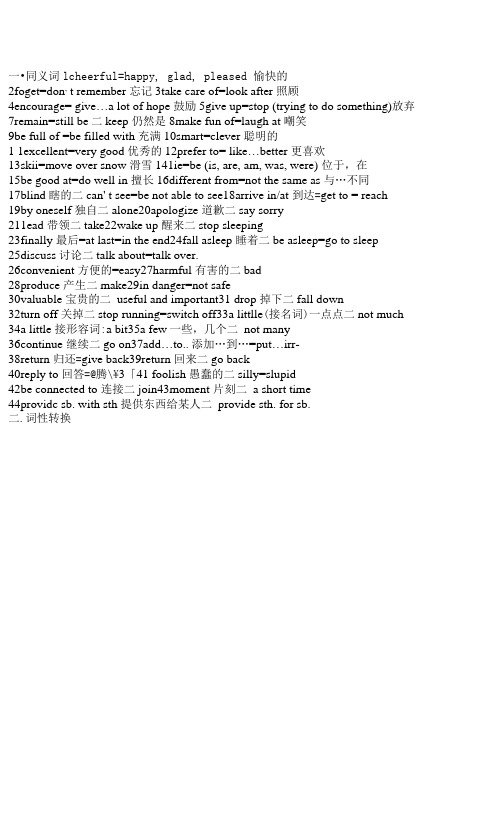
一•同义词lcheerful=happy, glad, pleased 愉快的2foget=don, t remember 忘记3take care of=look after 照顾4encourage= give…a lot of hope 鼓励5give up=stop (trying to do something)放弃7remain=still be二keep 仍然是8make fun of=laugh at 嘲笑9be full of =be filled with 充满10smart=clever 聪明的1 1excellent=very good 优秀的12prefer to= like…better 更喜欢13skii=move over snow 滑雪141ie=be (is, are, am, was, were) 位于,在15be good at=do well in 擅长16different from=not the same as 与…不同17blind 瞎的二can' t see=be not able to see18arrive in/at 到达=get to = reach19by oneself 独自二alone20apologize 道歉二say sorry211ead 带领二take22wake up 醒来二stop sleeping23finally 最后=at last=in the end24fall asleep 睡着二be asleep=go to sleep25discuss 讨论二talk about=talk over.26convenient 方便的=easy27harmful 有害的二bad28produce 产生二make29in danger=not safe30valuable 宝贵的二useful and important31 drop 掉下二fall down32turn off 关掉二stop running=switch off33a littlle(接名词)一点点二not much 34a little 接形容词:a bit35a few一些,几个二not many36continue 继续二go on37add…to..添加…到…=put…irr-38return 归还=give back39return 回来二go back40reply to 回答=@腾\¥3「41 foolish 愚蠢的二silly=slupid42be connected to 连接二join43moment 片刻二a short time44providc sb. with sth 提供东西给某人二provide sth. for sb.二.词性转换Icheer (v.)欢呼cheerful (adj.)快乐的2probable (adj)可能的一probably (adv.)很可能3care (v.)照顾,关心一careful (adj.)认真的,仔细的一carefully (adv)认真地,仔细地4success (n.)成功—successful (adj.)成功的5patient (adj.)耐心的;n.病人一patience (n.)耐心一impatient (adj.)没耐心的6France n.法国French n.法语,adj.法国的7possible(adj)-可能的impossible (adj)不可能的possibly (adv.)可能地8Europe n.欧洲European adj.欧洲的,n.欧洲人91ie v.躺,位于过去式lay现在分词lying; lie v.说谎一过去式liedlOreceive v.收到receicer n.接收者1 lintcrest (n.)兴趣interested (adj.)感到有趣的—interesting (adj.)令人感兴趣的12help v.帮助adj. Helpful有用的,助人的13mean v.表示…意思meaning n.意思14reception n.接待处receptionist n.接待员15apologize v.道歉apology n.道歉161ead v.带领lead (过去式)leader n.领导17final adj.最后的finally adv.最后18appcar v.出现disappear v.消失19asleep adj.睡着的—sleepy adj.欲睡的sleep v.睡着20act v.扮演actor男演员actress女演员adj./advadj./adv 晚的/地,迟的、地later 比较级later adv.之后;22drink 喝drinkable 可饮用的23salt n.盐adj. salty 咸的24experiment n.实验experimental adj.实验的25chemist n.化学家n. chemistry化学chemical n.化学品(可数名词)26value n.宝贵valuable adj.宝贵的27many/much 很多more 更多most 最多28a few 一些,几个一fewer很少一fewest最少29a little一点点less 很少least 最少30fight v.战斗fought 过去式fighter n.战士31harm v.伤害harmful adj 有害的32convennicncc n.方便convenient adj.方便的33imagine v.想象imagination n.想象diseasen… 有病的diseasen.. n 疾病35contain v.包含container n.容器36fool v.捉弄;n.傻子----foolish adj.愚蠢的37cookv.煮,炒;n.厨师——cooker n.厨具。
新人教版八年级英语上册Unit 6 单元词句梳理
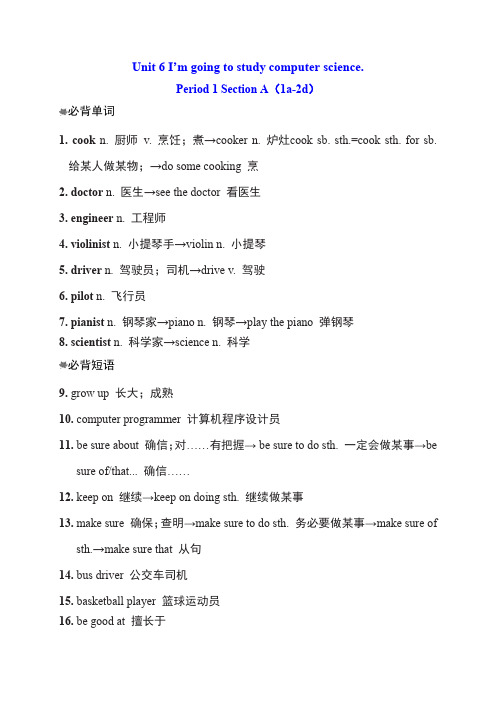
Unit 6 I’m going to study computer science.Period 1 Section A(1a-2d)必背单词1. cook n. 厨师v. 烹饪;煮→cooker n. 炉灶cook sb. sth.=cook sth. for sb. 给某人做某物;→do some cooking 烹2. doctor n. 医生→see the doctor 看医生3. engineer n. 工程师4. violinist n. 小提琴手→violin n. 小提琴5. driver n. 驾驶员;司机→drive v. 驾驶6. pilot n. 飞行员7. pianist n. 钢琴家→piano n. 钢琴→play the piano 弹钢琴8. scientist n. 科学家→science n. 科学必背短语9. grow up 长大;成熟10. computer programmer 计算机程序设计员11. be sure about 确信;对……有把握→ be sure to do sth. 一定会做某事→besure of/that... 确信……12. keep on 继续→keep on doing sth. 继续做某事13. make sure 确保;查明→make sure to do sth. 务必要做某事→make sure ofsth.→make sure that 从句14. bus driver 公交车司机15. basketball player 篮球运动员16. be good at 擅长于必背句子17. What do you want to be when you grow up?你长大了想成为什么?18. I want to be an engineer.我想成为一名工程师。
Period 2 Section A(Grammar Focus-3c)必背单词1. college n. 学院;大学;高等专科学校→ go to college 去上大学2. education n. 教育→educate v. 教育→educational adj. 有教育意义的3. medicine n. 药;医学→ medical adj. 医疗的→ take some medicine 服药4. university n.(综合性)大学;高等学府5. London 伦敦6. article n. 文章;论文7. send v. 邮寄;发送→ 过去式sent→ send ...to... 送……给必背短语8. take singing lessons 上歌唱课必背语法9. How are you going to do that?你将如何做?10. I am going to write articles and send them to magazines and newspapers.我将要写文章并向杂志和报纸投稿。
五年级上册所有的英语同义句和同义词

五年级上册所有的英语同义句和同义词一、关于数字和数学的单词1. one - 1同义词: single同义句: I have one apple. = I have a single apple.2. two - 2同义词: p本人r同义句: I have two pencils. = I have a p本人r of pencils.3. three - 3同义词: trio同义句: There are three cats. = There is a trio of cats.4. four - 4同义词: quartet同义句: There are four ch本人rs. = There is a quartet of ch本人rs.5. five - 5同义词: quintet同义句: There are five stars. = There is a quintet of stars.6. six - 6同义词: sextet同义句: There are six cups. = There is a sextet of cups.7. seven - 7同义词: septet同义句: There are seven books. = There is a septet of books.8. eight - 8同义词: octet同义句: There are eight students. = There is an octet of students.9. nine - 9同义词: nonet同义句: There are nine apples. = There is a nonet of apples.10. ten - 10同义词: decade同义句: There are ten marbles. = There is a decade of marbles.二、关于日常用语的同义词和同义句1. Hello同义词: Hi, Greetings同义句: Hello, how are you? = Hi, how are you?2. Good morning同义词: Greetings同义句: Good morning, how are you? = Greetings, how are you?3. Good afternoon同义词: Greetings同义句: Good afternoon, how are you? = Greetings, how are you?4. Good evening同义词: Greetings同义句: Good evening, how are you? = Greetings, how are you?5. Goodbye同义词: Farewell同义句: Goodbye, see you later. = Farewell, see you later.6. Thank you同义词: Thanks同义句: Thank you for your help. = Thanks for your help.同义词: Apology同义句: I'm sorry for my mistake. = I apologize for my mistake.8. Please同义词: Kindly同义句: Can you open the door, please? = Can you open the door, kindly?9. Yes同义词: Affirmative同义句: Yes, I agree with you. = Affirmative, I agree with you.10. No同义词: Negative同义句: No, I don't want to go. = Negative, I don't want to go.三、关于描述人物和事物的形容词和名词1. Big同义词: Large, Huge同义句: The elephant is big. = The elephant is large. The elephant is huge.同义词: Little, Tiny同义句: The baby is small. = The baby is little. The baby is tiny.3. Happy同义词: Joyful, Glad同义句: I am happy today. = I am joyful today. I am glad today.4. Sad同义词: Unhappy, Sorrowful同义句: The news made me sad. = The news made me unhappy. The news made me sorrowful.5. Hot同义词: Warm, Boiling同义句: The tea is hot. = The tea is warm. The tea is boiling.6. Cold同义词: Chilly, Freezing同义句: It's cold outside. = It's chilly outside. It's freezing outside.7. Good同义词: Excellent, Great同义句: She is a good student. = She is an excellent student. She is a great student.8. Bad同义词: Terrible, Awful同义句: It was a bad day. = It was a terrible day. It was an awful day.9. Fast同义词: Quick, Rapid同义句: He runs fast. = He runs quick. He runs rapid.10. Slow同义词: Sluggish, Lethargic同义句: The turtle is slow. = The turtle is sluggish. The turtle is lethargic.以上就是五年级上册所有的英语同义句和同义词的一些例子,通过这些例子我们可以更深入地理解英语词语之间的关系,为进一步学习提供了良好的基础。
部编版五年级上册英语第六单元知识总结-Unit 6知识点总结
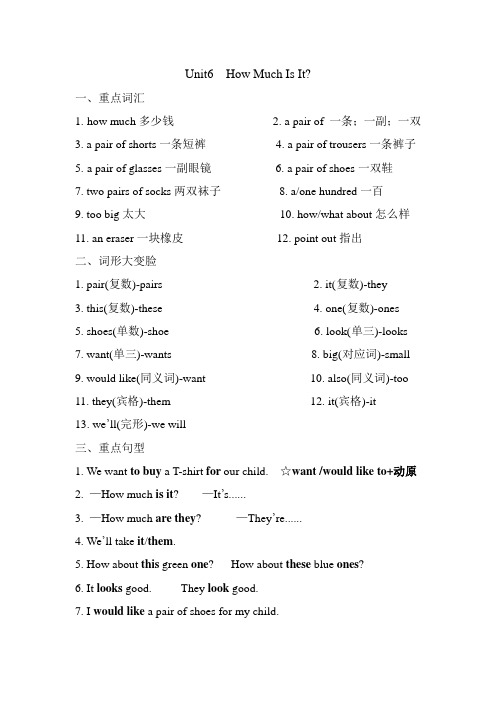
Unit6 How Much Is It?一、重点词汇1.how much多少钱2. a pair of 一条;一副;一双3. a pair of shorts一条短裤4. a pair of trousers一条裤子5.a pair of glasses一副眼镜6. a pair of shoes一双鞋7. two pairs of socks两双袜子8. a/one hundred一百9. too big太大10. how/what about怎么样11. an eraser一块橡皮12. point out指出二、词形大变脸1. pair(复数)-pairs2. it(复数)-they3. this(复数)-these4. one(复数)-ones5. shoes(单数)-shoe6. look(单三)-looks7. want(单三)-wants8. big(对应词)-small9. would like(同义词)-want 10. also(同义词)-too 11. they(宾格)-them 12. it(宾格)-it13. we’ll(完形)-we will三、重点句型1. We want to buy a T-shirt for our child. ☆want /would like to+动原2. —How much is it? —It’s......3. —How much are they? —They’re......4. We’ll take it/them.5. How about this green one? How about these blue ones?6. It looks good. They look good.7. I would like a pair of shoes for my child.8. Here are the hats.9. —Which one do you like?—I like the yellow one.10.I want a pair of shorts.I would like an eraser. ☆would like/want+名词11.How much are the glasses?12.People come to the supermarket to buy food, drinks and clothesafter work.四、句型转换:1.People can buy food, drinks and clothes in the supermarket.(画线提问)What can people buy in the supermarket?2. The shorts are thirty-eight yuan. ( 画线提问)How much are the shorts?3. She is going to buy some bread and cookies. (画线提问)What is she going to buy?4. They are one hundred yuan. (画线提问)How much are they?5. I would like a dress for my daughter. (改为一般疑问句)Would you like a dress for your daughter?6. Do you want to buy a T-shirt? (作肯否定回答)肯:Yes, I do. 否:No, I don’t.7. Does Lily want to buy a T-shirt? (作肯否定回答)肯:Yes, she does.否:No, she doesn’t.。
人教版四年级英语下册unit-6_知识点归纳
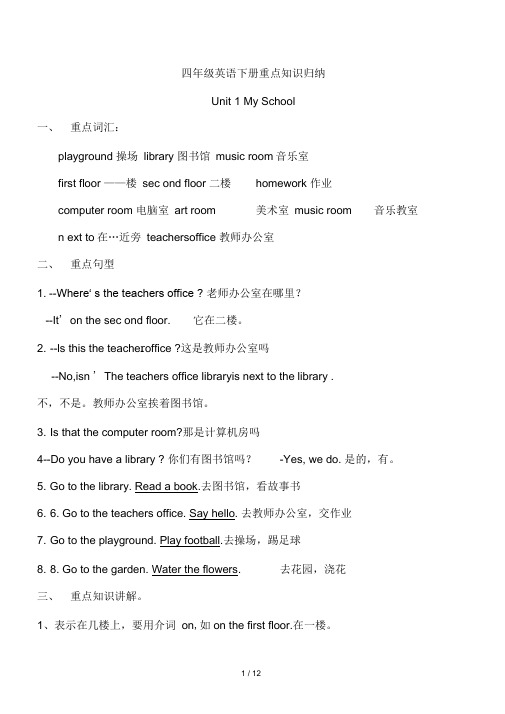
四年级英语下册重点知识归纳Unit 1 My School一、重点词汇:playground 操场library 图书馆music room音乐室first floor ——楼sec ond floor 二楼homework 作业computer room 电脑室art room 美术室music room 音乐教室n ext to在…近旁teachersoffice 教师办公室二、重点句型1. --Where‘ s the teachers office ? 老师办公室在哪里?--It' on the sec ond floor. 它在二楼。
2. --ls this the teache r office ?这是教师办公室吗--No,isn ' The teachers office libraryis next to the library .不,不是。
教师办公室挨着图书馆。
3. Is that the computer room?那是计算机房吗4--Do you have a library ? 你们有图书馆吗?-Yes, we do. 是的,有。
5. Go to the library. Read a book.去图书馆,看故事书6. 6. Go to the teachers office. Say hello. 去教师办公室,交作业7. Go to the playground. Play football.去操场,踢足球8. 8. Go to the garden. Water the flowers. 去花园,浇花三、重点知识讲解。
1、表示在几楼上,要用介词on,如on the first floor.在一楼。
The first表示第一的,序数词在使用时前面一定要加the,表示事物的排列顺序One —(基数词)f first第一(序数词)two二(基数词)f seco nd第二(序数词)2、介绍离自己近的事物时用this is….,介绍离自己比较远的事物时用that is…女口:This is my computer.这是我的计算机。
Unit 6 同义词和同义句型

(2)肯定句与否定同义的句型。例如:
原文:It's clear that this visit is different from last time. 选项:This visit is not the same as last time.
原文:Almost everyone had finished the book. 选项:Only a few people hadn't finished the book.
Unit 6
同义词和同义句型
本单元我们要攻克的难关是听力中的同义词和 同义句型。我们要达到的目标是:
1. 了解一些英语中常见的同义表达方式。
2. 能在听力中准确地把握原文意思,快速识 别原文的同义表达选项。
Part A 预备知识
Exercise 1 Q:What do we learn from this conversation? A: The woman didn't expect it to be so warm at noon. B: The woman was sensitive to weather changes. C: The weather forecast was unreliable. D: The weather turned cold all of sudden.
Vocabulary enrage v.愤怒 outrage v.愤怒 discipline n.训练 thoughtful adj.体贴的,周到的 proper adj.合适的 full scholarship n.全额奖学金 faint v.晕倒
八年级英语(仁爱版)Unit6重点归纳

八年级英语(仁爱版)Unit6重点归纳英语仁爱版Unit6重点归纳一. 重点词汇( 一 ) 词形转换:1.discuss(v.) discussion(n.)2.queen(对应词) kingfortable(adj.) comfort.(n.)4.safely(adv.) safe (adj.) safety(n.)(二)重点词组:1.go on a visit to 去……旅行2. make the decision 做决定3.bring back 带回4.go on a field trip 去野外旅行5.decideon (upon) sth 对某事做出决定6 see the sunrise 看日出7. my pleasure 不客气 8. come up with 想出(主意)9.look forward to (doing) sth 期望10. S人+pay for支付;赔偿 11. raise money 筹钱 12.some places of interest 名胜13. make a room for sb 为……订房间14.have a wonderful time 玩得愉快15. in the daytime 在白天16. a two-day visit 为期两天的旅行17.find out 查出,找出二.重点句型及重点语言点1. I have some exciting news to tell you. 我有一些激动人心的消息要告诉你们。
to tell you 是动词不定式短语,作定语。
动词不定式作定语时常放在被修饰的名词或代词之后。
如: I havenothing to talk about. He has a lot of work to do.2. Sounds great!= It sounds great! 听起来不错。
3. We will go on a two-day visit to Mount Tai. 我们将要去泰山玩两天。
2019年秋季新版外研版英语必修二unit 6单词详解

Unit 61.shark [ʃɑːk] n. 鲨(鱼), 坑蒙拐骗的人;诈骗者vi. 骗取;榨取;用不正当手段攫取;勒索诈骗card shark 玩纸牌老手,玩牌高手,以赌纸牌行骗为生的人2. scare [skeə(r)] v. 使(某人)惊恐,吓唬, 受惊吓;害怕;恐惧n.恐慌;恐惧;惊吓;惊恐scared adj.害怕;恐惧;畏惧;担心scary adj.恐怖的;吓人的scare sb↔away/off把…吓跑scare sb into doing sth威胁,恐吓(某人做某事)scare sb↔off(尤指无意中)把人吓倒,使人害怕,使恐惧scare up sth(NAmE, informal) (就现有材料)勉强凑合frighten/scare sb to death把某人吓得要命scare sb stiff 把某人吓呆“惊吓,惊恐”同义词辨析:alarm着重指某人意识到危险而突然产生的惊恐frighten普通用词,使用广泛,指产生突然、短暂的惊慌、恐怖感startle强调突然使人惊骇或震惊terrify语气最强,指惊骇得六神无主,魂飞魄散scare指非正式文体中可与frighten换用,但语气较重,侧重人受惊吓后立即停下正在干的事或跑掉intimidate特指恐吓某人,迫使其做某事。
3.due to 由于,因为同义词辨析:due to prep. 由于,因为。
较正式用语,常用于官方通告和公开声明中,直接作表语。
because of prep. 因为。
常后接人或事物,强调其为某事物发生的原因,在英语口语中更为常用。
owing to prep. [正式]因为,由于。
其后多接某事物,常可与due to 换用。
4. fin v. 切去(鱼的)鳍,给…装上翅片;(猛烈地)拍动(鳍)n 鱼鳍,鳍状物,翼(车辆、航空器等用以保持平衡等的突出窄扁部分)5. dive [daɪv] v.(通常指使用呼吸设备的)潜水,俯冲;急剧下降;冲去;扑去;探究;跳水,潜水n. 冲,扑,突然消失;低级酒馆;跳水;(足球)假摔俯冲;急剧下降;dive into sth(informal) 迅速将手伸入(包或口袋里)make a dive (for sth)迅速移动;猛然一跳;扑跃dive in 热切地开始take a dive/put sth in a dive(数量,价值或运气的)突降,暴跌pull out of the dive俯冲,下潜6. target[ˈtɑːɡɪt] v. 把……作为目标,把…作为批评的对象;面向,把…对准(某群体)n.目标;指标;(攻击的)目标,对象;靶;靶子同义词辨析:purpose n. 目的。
Unit 6 单词详解 【新教材】外研版(2019)选择性必修第二册
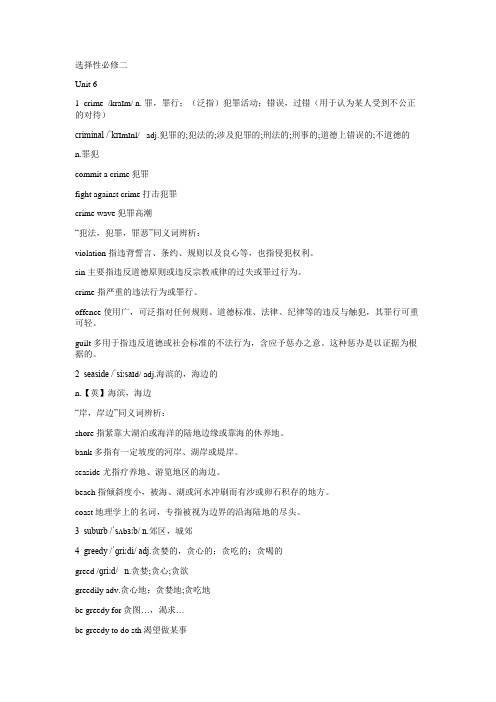
选择性必修二Unit 61 crime /kraɪm/ n. 罪,罪行;(泛指)犯罪活动;错误,过错(用于认为某人受到不公正的对待)criminal /ˈkrɪmɪnl/ adj.犯罪的;犯法的;涉及犯罪的;刑法的;刑事的;道德上错误的;不道德的n.罪犯commit a crime犯罪fight against crime打击犯罪crime wave犯罪高潮“犯法,犯罪,罪恶”同义词辨析:violation 指违背誓言、条约、规则以及良心等,也指侵犯权利。
sin 主要指违反道德原则或违反宗教戒律的过失或罪过行为。
crime 指严重的违法行为或罪行。
offence 使用广,可泛指对任何规则、道德标准、法律、纪律等的违反与触犯,其罪行可重可轻。
guilt 多用于指违反道德或社会标准的不法行为,含应予惩办之意。
这种惩办是以证据为根据的。
2 seaside /ˈsiːsaɪd/ adj.海滨的,海边的n.【英】海滨,海边“岸,岸边”同义词辨析:shore 指紧靠大湖泊或海洋的陆地边缘或靠海的休养地。
bank 多指有一定坡度的河岸、湖岸或堤岸。
seaside 尤指疗养地、游览地区的海边。
beach 指倾斜度小,被海、湖或河水冲刷而有沙或卵石积存的地方。
coast 地理学上的名词,专指被视为边界的沿海陆地的尽头。
3 suburb /ˈsʌbɜːb/ n.郊区,城郊4 greedy /ˈɡriːdi/ adj.贪婪的,贪心的;贪吃的;贪喝的greed /ɡriːd/ n.贪婪;贪心;贪欲greedily adv.贪心地;贪婪地;贪吃地be greedy for贪图…,渴求…be greedy to do sth渴望做某事with greedy eyes贪婪地greedy guts (BrE, informal) 贪吃的家伙“贪婪的”同义词辨析:greedy adj. 贪吃的;贪婪的。
指对食物、钱财、权力等贪婪或贪心的。
unit 6【复习课件】七年级英语下册单元复习(人教版)
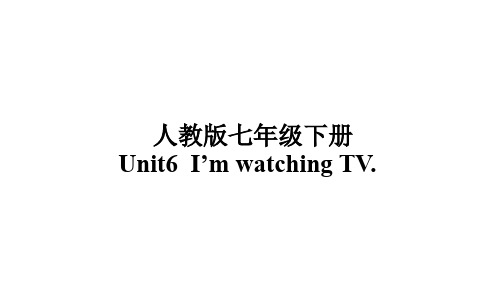
以ie 结尾的重读开音节词, 变ie为y+-ing
die-dying, lie-lying, tietying. . .
考点2 现在进行时的一些标志词或提示
考向1 题干中有look, listen, now 等标志词时用现在进行时。
Look! A cat is running to you.
看!一只猫正跑向你。 考题 —What’s that noise, Sam?
2. —___I_s_____ ____h__e___ ___r_e_a_d_i_n_ga newspaper?
他正在看报纸吗?
—__Y__e_s____, he _____i_s___. / _______N__o, he ________i_s.n’t
是的, 他在看。/ 不, 他没看。
3. —___I_s____ the man ___s_w__im__m__i_nign a river?
考题 — Sssh! Be quiet. I’m on the phone.
—Who _____B__ you _______ to, Mom?
A. do; speak
B. are; speaking
C. will; speak
D. have; spoken
考点3 现在进行时的特殊用法 考向1 【难点】现在进行时与always 连用, 表示反复出现或习
24. delicious adj. 可口的; 美味的→ ______d_e_l_ic_i_o_u__s_f_o_o美d食 25. race n. 竞赛→ ___i_n__a__r_a_c_e在比赛中
26. still adv. 还; 仍然
27. any adj. 任何的; 任一的→ _____a_n_y__o_n_任e 何一个
新版8A牛津英语unit6 知识点

教学目标:本单元知识点与语法讲解Welcome:1.I often go to the market to watc h the birds.我经常去市场观鸟.watch the birds= go birdwatching意为“观鸟,看鸟"。
to watch the birds是动词不定式作目的状语,对目的状语提问用why。
—Why did you get up so early this morning?-To catc h the first train.表示“去某地"有三种情况:(1)go+表示地点的副词there,home等。
(2)go+to+表示地点的名词。
go to school上学go to work上班go to college上大学(3) go+to+the+表示地点的名词。
go to the factory去工厂go to the park去公园探究点二:look,see和watch有何区别?(1)从词义上看:look通常表示主动地、有意识地“看",侧重指看的行为;(动作)see通常指看的客观结果,即“看见”;(结果)watch也指有意识地看,但往往指仔细地盯着事物的变化.(过程)I looked hard but saw nothing。
If you watch (look)carefully, you will see how I do it。
(2)从是否及物来看:①look通常为不及物动词,若接宾语,其后须接介词(如:at,for,after等)。
Look at the blackboard.②see可用作及物或不及物动词。
It was so dark that I could hardly see (it).③watch通常为及物动词。
Did you watch the tennis match?(3)从时态上看:look和watch可用于进行时态,而see作为感官动词,一般不用于进行时态.但有时表示有意识的行为(如表示“看望"、“会见”、“陪送”等),也可用于进行时态.He is seeing his friend off。
Unit 6 Keep our city clean --教师版
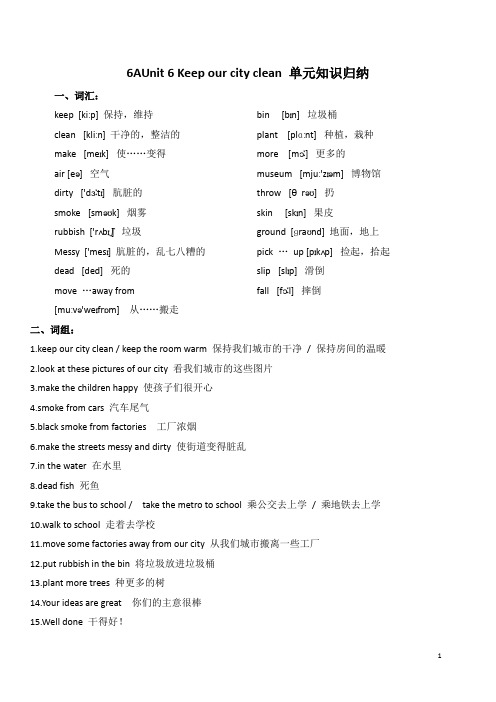
6AUnit 6 Keep our city clean 单元知识归纳一、词汇:keep [kiːp] 保持,维持clean [kliːn] 干净的,整洁的make [meɪk] 使……变得air [eə] 空气dirty ['dɜːtɪ] 肮脏的smoke [sməʊk] 烟雾rubbish ['rʌbɪʃ] 垃圾Messy ['mesɪ] 肮脏的,乱七八糟的dead [ded] 死的move …away from[muːvə'weɪfrɒm] 从……搬走bin [bɪn] 垃圾桶plant [plɑːnt] 种植,栽种more [mɔː] 更多的museum [mjuː'zɪəm] 博物馆throw [θrəʊ] 扔skin [skɪn] 果皮ground [ɡraʊnd] 地面,地上pick …up [pɪkʌp] 捡起,拾起slip [slɪp] 滑倒fall [fɔːl] 摔倒二、词组:1.keep our city clean / keep the room warm 保持我们城市的干净/ 保持房间的温暖2.look at these pictures of our city 看我们城市的这些图片3.make the children happy 使孩子们很开心4.smoke from cars 汽车尾气5.black smoke from factories 工厂浓烟6.make the streets messy and dirty 使街道变得脏乱7.in the water 在水里8.dead fish 死鱼9.take the bus to school / take the metro to school 乘公交去上学/ 乘地铁去上学10.walk to school 走着去学校11.move some factories away from our city 从我们城市搬离一些工厂12.put rubbish in the bin 将垃圾放进垃圾桶13.plant more trees 种更多的树14.Your ideas are great 你们的主意很棒15.Well done 干得好!16.clean the desks and chairs 清理桌椅17.throw rubbish on the floor 把垃圾扔在地上18.two little blackbirds 两只小画眉19.fly away 飞走20.walk home after school 放学后走回家21.like living in the city 喜欢居住在这个城市22.many museums, shops and cinemas 很多博物馆、商店和电影院23.a clean and beautiful city 一个既干净又漂亮的城市24.throw a banana skin on the ground 将香蕉片扔在地上25.like eating bananas 喜欢吃香蕉26.shouldn’t do that 不能那样做27.pick it up / pick the waste paper up 捡起它/ 捡起废纸28.slip on the banana skin 在香蕉片上滑倒29.to keep the park clean 为了保持公园的干净30.how to keep the air clean 怎样保持空气的清洁31.a lot of beautiful flowers and trees 很多漂亮的花和树32.see a clean / dirty river 看见一个干净/ 肮脏的小河33.a grey sky 灰色的天空34.drink dirty water 喝脏水35.walk in the messy and dirty streets 在脏乱的街道上走e back 返回37.clean the desks and chairs 清理桌椅38.go to hospital 去医院看病39.how to do sth 如何做某事三、句子:1. What makes the air dirty? 什么使空气变脏?Smoke makes the air dirty.烟雾使空气变脏。
高二英语 单元单词短语句型知识梳理 Unit6 第二册
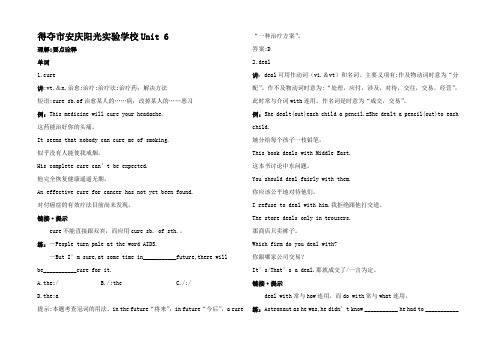
得夺市安庆阳光实验学校Unit 6理解:要点诠释单词1.cure讲:vt.&n.治愈;治疗;治疗法;治疗药;解决方法短语:cure sb.of治愈某人的……病;改掉某人的……恶习例:This medicine will cure your headache.这药能治好你的头痛。
It seems that nobody can cure me of smoking.似乎没有人能使我戒烟。
His complete cure can’t be expected.他完全恢复健康遥遥无期。
An effective cure for cancer has not yet been found.对付癌症的有效疗法目前尚未发现。
链接·提示cure不能直接跟双宾,而应用cure sb. of sth.。
练:—People turn pale at the word AIDS.—But I’m sure,at some time in___________future,there willbe___________cure for it.A.the;/B./;theC./;/D.the;a提示:本题考查冠词的用法。
in the future“将来”;in future“今后”,a cure “一种治疗方案”。
答案:D2.deal讲:deal可用作动词(vi.&vt)和名词。
主要义项有:作及物动词时意为“分配”。
作不及物动词时意为:“处理,应付,涉及,对待,交往,交易,经营”,此时常与介词with连用。
作名词是时意为“成交,交易”。
例:She dealt(out)each child a pencil.=She dealt a pencil(out)to each child.她分给每个孩子一枝铅笔。
This book deals with Middle East.这本书讨论中东问题。
You should deal fairly with them.你应该公平地对待他们。
人教新目标七年级上册英语Unit6讲义及习题
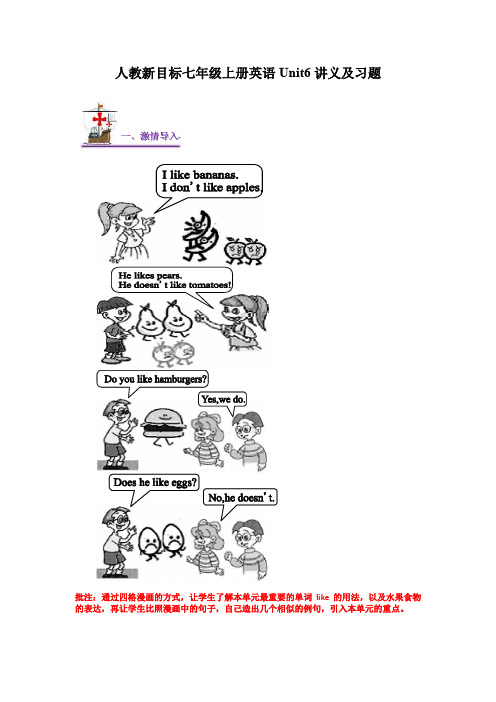
人教新目标七年级上册英语Unit6讲义及习题批注:通过四格漫画的方式,让学生了解本单元最重要的单词like的用法,以及水果食物的表达,再让学生比照漫画中的句子,自己造出几个相似的例句,引入本单元的重点。
(建议20-25分钟)一、词汇Words1,like 喜欢【巧记提示】like(喜欢)→bike(自行车【经典例句】我喜欢茶甚于咖啡。
【考点聚焦】1)like后面常跟动词ing形式,即like doing sth.表示经常喜欢做某事,表示习惯性的爱好。
而like to do sth.通常表示一次性或临时性的、具体的喜好。
2)like 还可作介词,意思是“像……一样”。
【口语练习】What do you like to do after school?【活学活用】选择JimA. doesn’t like eatB. likes to eatingC. like eatingD. likes to eatKeys:D批注:通过例句让学生掌握单词的用法,尤其是重点考点的讲解,通过口语练习以及活学活用,让学生进一步巩固2,tomato n. 西红柿【经典例句】他们把西红柿称为“爱情果”。
【考点聚焦】复数形式是在后面加es。
【归纳】在英语中,以o结尾的可数名变复数分为两类:1)表示有生命意义的名词,加-es:negro黑人,hero英雄,potato土豆,tomato西红柿【巧记】:黑人英雄爱吃西红柿和土豆。
2)表示无生命意义的名词,加-s:photo相片,radio录音机,piano钢琴,zoo动物园等。
【口语练习】Do you like tomato?【活学活用】用tomato的适当形式填空I like eggs, but I don’t like these.Keys:tomato, tomatoes批注:通过例句让学生掌握单词的用法,尤其是重点考点的讲解,通过口语练习以及活学活用,让学生进一步巩固3,orange n.橘子,橙子【经典例句】Here is a 这儿有一箱橙子。
八年级英语上册(unit 6 i’m more outgoing than my sister)单词巧记+句型语法剖析 人教新目标版

八年级上册单词巧记+句型语法剖析Unit 6 I’m more outgoing than my sister三眯剖析单词·巧记·典句·考点more []adj. 更;更多的;更大的【巧记提示】m+ore(矿石【经典例句】We should show more我们应当更关心别人。
【考点聚焦】1)more是many和much的比较级,也和部分双音节词和多音节词构成它们的比较级。
2)当“另外的”讲,常与some连用。
【活学活用】1.选择1)Would you like someA.moreB.otherC.else2)Do you have anythingA.someB.elseC.otherD.the others答案:1)A 2)Bthan []conj比【巧记提示】than(比)→then(然后【经典例句】Steel is stronger than i钢比铁强度大。
【考点聚焦】用于含有比较级的句子中,起连接的作用。
【活学活用】2.选择I prefer fishing I think it’sA.more boringC.the most boringD.boring答案:Bboth []pron. 两个(都);两者(都)【巧记提示】谐音为不(bo)是【经典例句】You are both你们两个都错了。
【考点聚焦】1)both放在系动词之后,实义动词之前。
2)短语:both...and 两个都【活学活用】3.主谓一致练习1)Both she and I2)Mike (be) both tall and handsome.答案:1)are 2)is Cmake []v使;促使;迫使【巧记提示】make(使)→take(拿走【经典例句】My mother made me babysit我母亲让我照看我的小妹妹。
【考点聚焦】1)make+adj. 如:我们尽力使我们的国家变得更美丽。
人教PEP六年级英语上册课件Unit 6
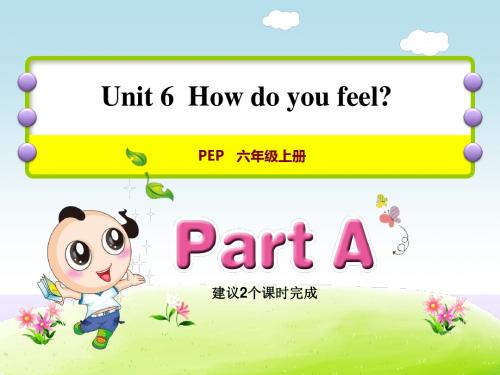
讲解来自《点拨》
知识点 2 He should see a doctor this morning... 他应该今天上午去看病…… 考向 用情态动词should提建议的陈述句 句型是: 主语+should+动词原形+其他。它对应的 问句是:What should+主语+do?
讲解来自《点拨》
易错点 提示 should后接动词原形,没有人称和数的变化。 他应该吃更多的水果。 (×)He should eats more fruit. ( √ )He should eat more fruit.
习题来自《点拨》
一、单项选择。 1. The children are ________ one another on the playground. C A.chase B.chaseing C.chasing
点拨: 句意为“孩子们在操场上相互追逐。”分析句
子可知是现在进行时,所以应用chase的现在 分词形式:chasing。
Sam: Oh, no! Mum: Don’t be sad. We can go next time. Sam: How does Dad feel now? Mum: Not well. Let’s go to the hospital.
How does Sam feel? What should he do?
My watch doesn’t work. (3)询问机器或东西的故障情况。 我的表不走了。
讲解来自《点拨》
拓展
如果想问某人或某物具体怎么了,句型是:What’s
wrong with+人/物? 注意人称代词用宾格形式。
例句:—What’s wrong with her? 她怎么了?
—She is ill.她生病了。
Unit6知识归纳人教版英语七年级上册(2)
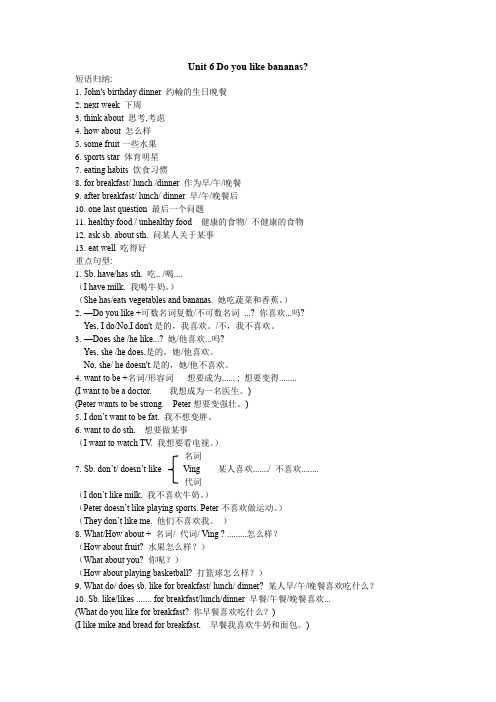
Unit 6 Do you like bananas?短语归纳:1.John's birthday dinner 约輸的生日晚餐2.next week 下周3.think about 思考,考虑4.how about 怎么样5.some fruit一些水果6.sport s star 体育明星7.eating habits 饮食习惯8.for breakfast/ lunch /dinner 作为早/午/晚餐9.after breakfast/ lunch/ dinner 早/午/晚餐后10.one last question 最后一个问题11.healthy food / unhealthy food 健康的食物/ 不健康的食物12.ask sb. about sth. 问某人关于某事13.eat well 吃得好重点句型:1.Sb. have/has sth. 吃.. /喝....(I have milk. 我喝牛奶。
)(She has/eats vegetables and bananas. 她吃蔬菜和香蕉。
)2.—Do you like +可数名词复数/不可数名词...? 你喜欢...吗?Yes, I do/No,I don't是的,我喜欢。
/不,我不喜欢。
3.—Does she /he like...? 她/他喜欢...吗?Yes, she /he does.是的,她/他喜欢。
No, she/ he doesn't.是的,她/他不喜欢。
4.want to be +名词/形容词想要成为...... ; 想要变得........(I want to be a doctor. 我想成为一名医生。
)(Peter wants to be strong. Peter想要变强壮。
)5.I don’t want to be fat. 我不想变胖。
6.want to do sth. 想要做某事(I want to watch TV. 我想要看电视。
Unit6Grammar2—同义词和反义词课件-广东省高一英语北师大版(2019)必修二
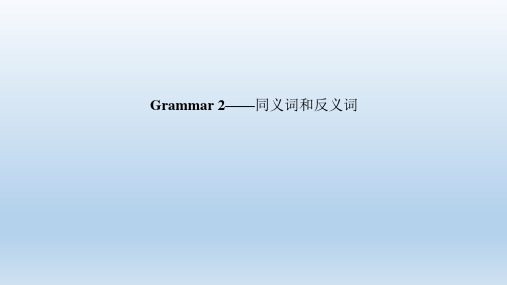
2.用同义词扩充词汇量 英语词汇丰富,利用同义词可以有助于扩充词汇量,比如表示“看”的同义词有 see,look,watch,glance,glare,stare等。
3.用同义词提升表达 在写作时,可以充分利用同义词提升表达的质量和准确性。例如: think→suggest/believe/advocate/suppose good→beneficial/helpful/sound/positive bad→harmful/negative
二、反义词 语义相对或者相反的词叫做反义词。和同义词一样,它们词性相同。
1.换位反义词 换位反义词就是指一种对立统一的关系,一方的存在以另一方的存在为前提,双 方形成一个对立的统一体。
If A sells a watch to B, B buys a watch from A. If A gives a pen to B, B receives a pen from A.
2.固定搭配中的反义词 英语中有许多由一对反义词构成的固定搭配。例如:here and there, now and then, day and night, up and down, etc.
3.反义词在谚语中的使用,通常用对偶句,它们结构相似,意思相反。 A white lie is better than a black lie. 一个善意的谎言总比一个恶意的谎言要好。
Grammar 2——同义词和反义词
在英语里,如果两个词语的意思相同或相近,那么它们就被称作同义词(synonyms), 而意思相反的词语叫作反义词(antonyms)。
一、同义词 1.同义词使用的注意事项
同义词是意义几乎相同的一组词语,它们词性相同。如work与job, hope与wish等。 同义词虽然意义基本相同,但由于语义、感情色彩、语体色彩、词的搭配和位置分 布的不同,有些同义词是有差异的,在不同场合要注意它们的运用。 例如:statesman和politician在字面上都是“政治家”的意思,但是,后者往往用其贬 义,表示“政客”的意思。
- 1、下载文档前请自行甄别文档内容的完整性,平台不提供额外的编辑、内容补充、找答案等附加服务。
- 2、"仅部分预览"的文档,不可在线预览部分如存在完整性等问题,可反馈申请退款(可完整预览的文档不适用该条件!)。
- 3、如文档侵犯您的权益,请联系客服反馈,我们会尽快为您处理(人工客服工作时间:9:00-18:30)。
Unit 6 同义词和同义句型本单元我们要攻克的难关是听力中的同义词和同义句型。
我们要达到的目标是:1. 了解一些英语中常见的同义表达方式。
2. 能在听力中准确地把握原文意思,快速识别原文的同义表达选项。
Part A 预备知识Eercise 1Q:What do we learn from this conversation?A: The woman didn't expect it to be so warm at noon.B: The woman was sensitive to weather changes.C: The weather forecast was unreliable.D: The weather turned cold all of sudden.同义词、同义词组我们把词义相同或相近的词叫同义词。
如scientist和research;disadvantage和downside, drawback; sign和indication等。
在各种听力考试中,这些同义词或同义词组通常被用来替换原文中的某些词或词组出现在选项中,例如:原文:An army of college students indulge themselves in playing games:选项:Many college students indulge themselves in playing games.原文:Bill dislike doing the laundry.选项:Bill doesn’t enjoy washing clothes.原文:The program will be on in a quarter of an hour.选项:The program will start in fifteen minute.原文:Jim hurt his right foot on the way back.选项:Jim hurt his foot when returning.原文:This lamp needs repairing right away.选项:This lamp has to be fixed immediately.同义句型同义句型是指意义相同或相近但结构不同的句型、句式。
在各种听力考试中,原文所表达的意思也往往被从句法的角度嫁衣转换出现在选项中,这中句型的转换常见的有以下三种:(1)主动与被动同义的句型。
例如:原文:It is widely accepted that more people use computers in the world today.选项:Computer are widely used in the world today.原文:Everyone should give back his library books on time.选项: Library books should be given back on time.原文:The students completely filled the classroom.选项:The classroom was filled with students.原文: The driver made a sudden turn, but it's too late, John was knocked down to the ground.选项:The car hit John as the driver turned suddenly.(2)肯定句与否定同义的句型。
例如:原文:It's clear that this visit is different from last time.选项:This visit is not the same as last time.原文:Almost everyone had finished the book.选项:Only a few people hadn't finished the book.原文:She spent the whole day investing this case.选项:She didn't do anything else today except her research.原文:My brother forgot to pick up our tickets for this evening's concert.选项:He didn't remember to get the tickets.原文:Betty no longer buys her morning coffee at the student center.选项:Betty stopped buying coffee in the morning at the student center.(3)因果关系调换的同义句型。
例如:原文:The pressure on the coastal zone resulted from the population shift.选项:The population shift contributed a lot to the pressure on the coastal zone.原文:While most people know that smoking can cause lung cancer, a new study show that few know that it is a major risk factor for bladder cancer.选项:Lung cancer usually results from smoking.(4)详细描述和简略概括的同义句型。
例如:原文:I picked up the receiver, drooped the coins in the slot, and then dialed the number I wanted.选项:I made a phone call.原文:Not only is Cherry a good swimmer, but she's also a promising musician.选项:Cherry has many talents.原文:We had ideal weather during vacation, not too hot and not too cold.选项:The weather was just right.原文:Grant wanted to find an apartment for $200 a month, but discovered he had to pay twice that much.选项:Grant had to pay $400 per month.原文:Mary selected an album, removed the record from its cover and put it on the turntable.选项:She chose some music to listen to.Vocabularyenrage v.愤怒outrage v.愤怒discipline n.训练thoughtful adj.体贴的,周到的proper adj.合适的full scholarship n.全额奖学金faint v.晕倒1.Listen to the statements and try to finish the multiple choice exercise.1) A. He looks at me. B. He borrowed my book.C. I used his book.D. I told him to look at me.2) A. Bill and Mary were angry about the cancellation.B. Bill and Mary canceled the meeting.C. Mary was outraged when she saw the bill.D. Bill and Mar are engaged to be married.3) A. His habit is to study late.B. He doesn't have a good place to study.C. His study habits are poor.D. He is disappointed with his studies.4) A. He recently visited us.B. He flew over our house.C. He was there for just two hours.D. He went to the other house.5) A. Lorraine gave her family a gift they liked.B. Her family thinks their gift will please Lorraine.C. Lorraine's family gave her a gift that pleased her.D. Lorraine thought about giving her family a gift.6) A. Walking early in the morning you will faint.B. Walking early in the morning is bad for your health.C. Walking earl in the evening will be good to your health.D. Walking early in the morning will do you good.7) A. I can never get new clothes because I have no money.B. I can never get the proper size of clothes for me.C. You can't give me clothes to defeat me.D. My mother never buys clothe for me.8) A. We ran out of paint a month ago.B. Painting was the last job we had to do.C. The work was completed last month.D. We ended up painting the furniture ourselves.9) A. The teacher asked me to repeat it.B. The teacher was asked to say it again.C. The teacher asked where I was.D. The teacher asked me a question.D. The teacher asked me a question.10) A. She taught others about the computer.B. She earned a lot by using a computer.C. She taught herself how to use the computer.D. She had to get help to use the computer.2. Listen to the conversations and try to finish the multiple choice exercise.1) A. She likes camping trips. B. She doesn't like camping.C. She lost her way last week.D. She will go camping next week.2)A. The man is very strange.B. The man can help the woman.C. The man doesn't know the way to the post-office, either.D. The man is not friendly.3)A. They hate it. B. They have no special reaction.C. They are undecided.D. They are pleased.4)A. His room is quite small.B. He has to walk around the dormitory.C. It's hard to find a room in the dormitory.D. It's his turn to inspect the dormitory room.5)A. Many people are employed these days.B. John's son is unfortunate.C. John has no job.D. Many people got their jobs except John.6)A. It was a long lecture, but easy to understand.B. It was not as easy as she had expected.C. It was as difficult as she had expected.D. It was interesting and easy to follow.7)A. She got up later than usual.B. The bus was late.C. She forgot she had class.D. Her clock was slow.8) A. She felt it was tiring.B. She felt it was very nice.C. She felt it took less time.D. She thought it was expensive.9) A. She was surprised that the university offered her a full scholarship.B. She expected the university to offer her a full scholarship.C. She would not go to study in Oxford University next year.D. She got a full time job in the university.10) A. John lost his job.B. John's illness is caused by heavy work.C. John often leaves his office.D. He complains that John gave him too much work.。
